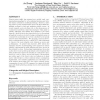Free Online Productivity Tools
i2Speak
i2Symbol
i2OCR
iTex2Img
iWeb2Print
iWeb2Shot
i2Type
iPdf2Split
iPdf2Merge
i2Bopomofo
i2Arabic
i2Style
i2Image
i2PDF
iLatex2Rtf
Sci2ools
MSWIM
2015
ACM
2015
ACM
RFT: Identifying Suitable Neighbors for Concurrent Transmissions in Point-to-Point Communications
Point-to-point tra c has emerged as a widely used communications paradigm for cyber-physical systems and wireless sensor networks in industrial settings. However, existing point-to-point communication protocols often entail substantial overhead to find and maintain reliable routes. In recent research, protocols that rely on the phenomenon of constructive interference have thus emerged. They allow to quickly, e ciently, and reliably flood packets to the entire network. As all nodes in the network need to (re-)broadcast all packets in such protocols by design, substantial energy is consumed by nodes that do not even contribute to the actual point-to-point transmission. We propose a novel point-topoint communication protocol, called RFT, which attempts to discover the most reliable route between a source and a destination. To achieve this objective, RFT selects the minimum number of participating nodes required to ensure reliable communications while allowing all other devices in the n...
| Added | 15 Apr 2016 |
| Updated | 15 Apr 2016 |
| Type | Journal |
| Year | 2015 |
| Where | MSWIM |
| Authors | Jin Zhang, Andreas Reinhardt, Wen Hu, Salil S. Kanhere |
Comments (0)

